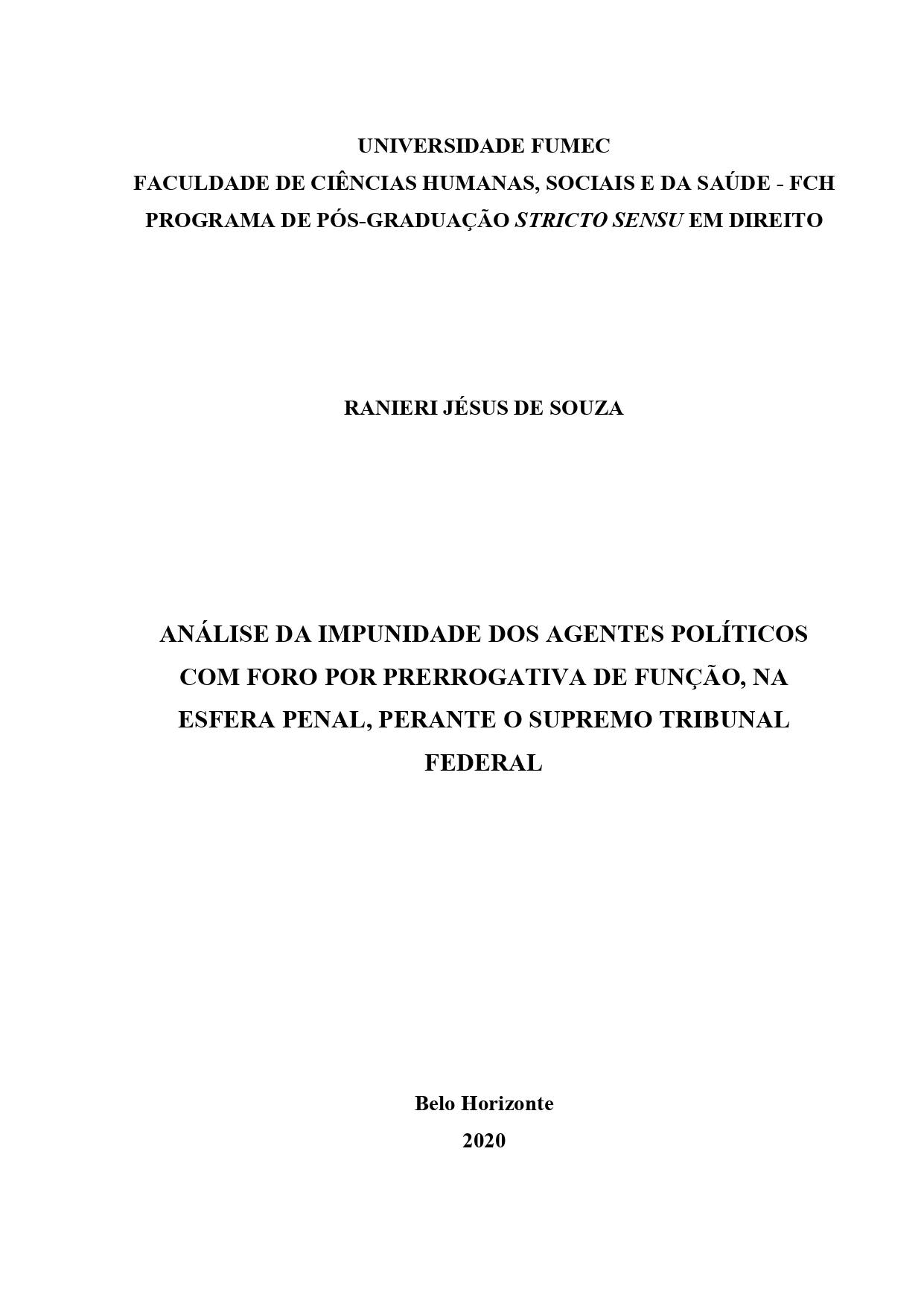Análise da impunidade dos agentes políticos com foro por prerrogativa de função, na esfera penal, perante o Supremo Tribunal Federal

Visualizar/
Data
2020Autor
Souza, Ranieri Jésus de
xmlui.mirage2.itemSummaryView.MetaData
Mostrar registro completoResumo
O Brasil e outros países do mundo adotam o foro por prerrogativa de função, com o objetivo
de dar proteção a funções públicas relevantes. Determinadas autoridades, em função dos
cargos que ocupam, têm a prerrogativa de serem julgadas por um órgão colegiado e não por
um juiz de primeira instância. A Constituição Brasileira de 1988 estabeleceu diversos casos
de autoridade com foro por prerrogativa de função, definindo em qual tribunal estas
autoridades são julgadas. Este estudo analisou se o foro por prerrogativa de função no
Supremo Tribunal Federal gera impunidade dos agentes políticos na esfera penal. A presente
pesquisa foi desenvolvida no âmbito da vertente sociológico-jurídica, com a análise do foro
por prerrogativa de função no âmbito jurídico e fático e teve como marco teórico os conceitos
propostos para o instituto na Constituição da República e na obra “O foro privilegiado” de
Lúcio Ney de Souza (2014). O trabalho foi desenvolvido com análise do direto comparado e
das Constituições brasileiras. Apontaram-se entraves do sistema, como o número excessivo de
autoridades com foro e a questão de o foro abranger crimes que ocorreram antes do momento
em que a autoridade assumiu o cargo ou, ainda, crimes que não guardam conexão com a
função exercida. Por fim, foram analisados dados levantados no Supremo Tribunal Federal
quanto ao julgamento de inquéritos e ações penais que tramitam na Corte em função do foro
por prerrogativa de função, no período de 2001 a 2016. Identificou-se que menos de 1% dos
processos de foro por prerrogativa de função resultam em condenação em ações penais de
competência originária do Supremo Tribunal Federal. Concluiu-se que o foro por prerrogativa
de função gera impunidade dos agentes políticos na esfera penal. Brazil and other countries in the world adopt the forum as a function of prerogative, with the
aim of protecting relevant public functions. Certain authorities, depending on the positions
they hold, have the prerogative to be tried by a collegiate body and not by a judge of first
instance. The Brazilian Constitution of 1988 established several cases of authority with
jurisdiction by function of prerogative, defining in which Court these authorities are judged.
This study analyzed whether the forum for the prerogative of function in the Supreme Federal
Court generates impunity for political agents in the criminal sphere. The present research was
developed in the scope of the sociological-legal aspect, with the analysis of the forum by
prerogative of function in the legal and factual scope and had as theoretical framework the
concepts proposed for the institute in the Constitution of the Republic and in the work “The
forum privileged”of Lúcio Ney de Souza (2014). Work carried out with analysis of the
comparative law and of the Brazilian Constitutions. Barriers of the system were pointed out,
such as the excessive number of authorities with jurisdiction and the question of whether the
forum covers crimes that occurred before the moment when the authority took office or, still,
crimes that do not have connection with the function performed. Finally, the results obtained
in the Supreme Federal Court were analyzed in relation to the judgment of investigations and
criminal proceedings that are pending before the Court due to the jurisdiction of the court,
from 2001 to 2016. It was identified that less than 1% of the court cases on the prerogative of
function result in condemnation in criminal proceedings within the jurisdiction of the
Supreme Federal Court. It was concluded that the forum by prerogative of function generates
impunity for political agents in the criminal sphere.
